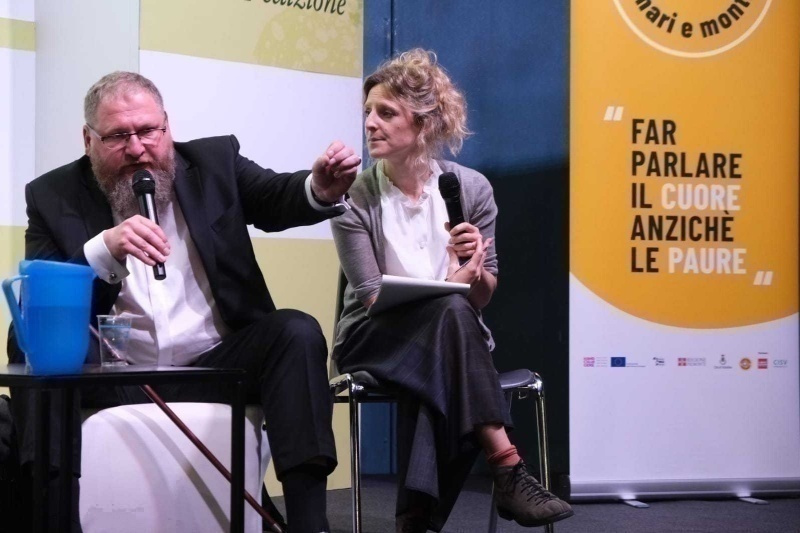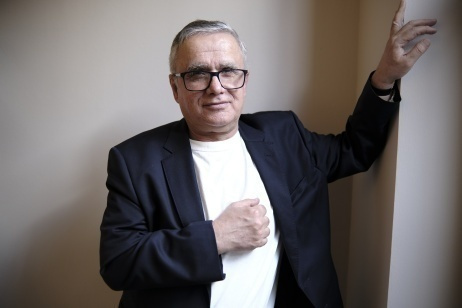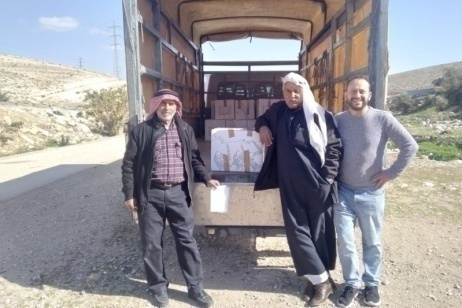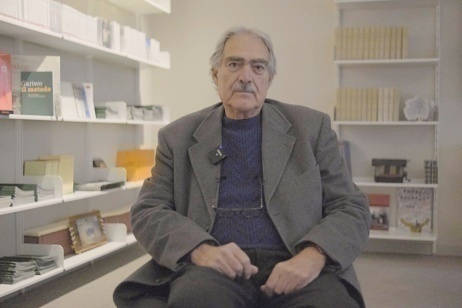Turin International Book Fair has just come to an end and our meetings with the organizations and people who once again enlivened it this year have given us several insights. In particular, in Sala Azzurra filled with hundreds of students, together with our friends from Spostiamo Mari e Monti, we promoted the meeting titled Fare Memoria oggi. Conoscere il passato per agire nel presente (Remembering today. Knowing the past to act in the present) with Gabriele Nissim, Piotr M.A. Cywiński, Francesco M. Cataluccio, Wlodek Goldkorn and moderator Sabrina Di Carlo.
We started from an actual and contextually complex question - what does (or should) exercising the duty of Remembrance in our unhinged time mean - we tried to find an answer with the help of a guest, the director of Auschwitz-Birkenau Memorial and Museum Piotr M.A. Cywiński, whose role brings him face to face with the challenges of the most tragically exemplary memory of the 20th century, that of the Holocaust, on a daily basis. He spoke of how accountable he feels in running such an important place (“not sacred but of death”, as Wlodek Goldkorn defined it), where over a million men, women and children lost their lives. However, he mainly spoke of visits to Auschwitz as “the awakening of moral restlessness that has no meaning unless it is a ritual of passage”, through which the life of those who pass through that gate as ‘tourists’ cannot remain the same. “Those who enter Auschwitz-Birkenau must leave somehow different, asking themselves important questions. This is the meaning of remembrance. It is more important to experience it than to talk about it, to make it one’s duty, not just the recounting of events that took place 80 years ago”. Such responsibility must be that of remembering evil, but also of investigating its mechanisms, of observing how they have repeated themselves all around the world.
“Until not so long ago”, Cywiński continued, “I was pessimistic about our ability to react as human beings in the face of each other’s suffering; I saw what happened to the Rohingya in Myanmar, to the Uighurs in Xinjiang, without anyone talking about it or caring about it. However, when I saw the reaction that Europe had towards the Russian invasion of Ukraine, I thought that something, after all, was there; not only due to solidarity that people showed, but also because many journalists and commentators linked the Ukrainian issue to what happened to the Jews in the Second World War, when they were left alone in collective indifference. For the very first time, it seemed to me that on a larger scale they were comparing different experiences by pinpointing their similarities. ‘Which side do I want to be on?’: only if we try to answer this question will remembrance make sense. Those who are honoured in the Gardens of the Righteous did not write online petitions, they helped someone else in a very actual way... they did not save the whole world but really helped someone. Today we know too much to allow ourselves the luxury of indifference”.
This concept is similar to the one expressed during the meeting by Gariwo’s President Gabriele Nissim: “It may seem that Zelensky made a stretch when comparing the Holocaust to what is happening in Ukraine. They are not the same thing obviously, but the Ukrainian leader wanted to show the stations of evil in our time: denying identity, invading, striking at freedom of expression, attacking populations, deporting children. It is a path to extreme evil”.
Outside of the debate in the hall, we asked a few more questions to Director Cywiński.
Auschwitz-Birkenau is the place where more than a million people were killed and, at the same time, one of the most visited destinations in the world. How can the balance between these two identities be maintained? How can we respect this place while making it universal for the memory and education of new generations?
People come to visit Auschwitz-Birkenau for different reasons; there are groups of students, relatives of victims, simple tourists. I am not so interested in why they come, in my opinion the most important thing is what they take away once they leave after those three or four hours of visiting. Consequences are more important than the reasons or intentions for coming.
What do you consider to be the hardest “challenge”, or responsibility, in running Auschwitz-Birkenau Museum and Memorial today? How do you deal, for example, with the issue of maintaining the authenticity of the sites?
In my opinion, there are two things to be pursued as best as possible, in managing a place of such significance: the educational value and the preservation of authenticity. I also believe that these are two of the main objectives of remembrance; any manager of a place of remembrance must reach a balance between these two elements. Then of course finance plays an important role, for funds needed to do all this.
What are young people who come to visit Auschwitz-Birkenau looking for?
They are about 50 to 60 per cent of total visitors, generally coming in organised groups, schools, associations, etc. They are completely different, depending on the country they come from, the traditions of their families, their culture or religion, ethnic or national group. It also depends on how they are taught historical facts in school, which differs a lot, for example, in Europe and in the United States. There is a whole mosaic of people and it is extremely difficult to make a sociological analysis and define the average visitor.
How do you approach these very different people?
The general commitment is the same, we tell them the facts. However, we have 350 guides who speak 20 different languages and are familiar with school curricula, as well as current affairs, of the various countries from which visitors come. Guides must also be ready to react to the questions they are asked, which are not only about history but are also reflections on the present. And this is extremely important: not locking memory and history only in the past, but rather considering them as a beacon on our moral responsibilities and decisions in the present.
What, then, is the role of remembrance for the future?
This is a very difficult question, in that we are living in a time when new generations are no longer in touch with their past. Their grandparents were born after the war and there are few survivors left. However, beyond this, I think there are two scenarios. One is the risk for the Holocaust to become part of general history, a crucial fact but a fact nonetheless. Fifty years from now, it could be perceived as a historical event on a par with Napoleon Bonaparte.
The other possibility is that remembrance enters collective consciousness as a fundamental part of our identity, of our understanding of human beings.
Something that is far more profound than historical knowledge. After the Holocaust, much has changed in collective perception, in Europe and in the world. It was a point of no return and our actions in the future must take this into account. If we use this perspective, I believe that the Holocaust will have its rightful place in future thinking.







